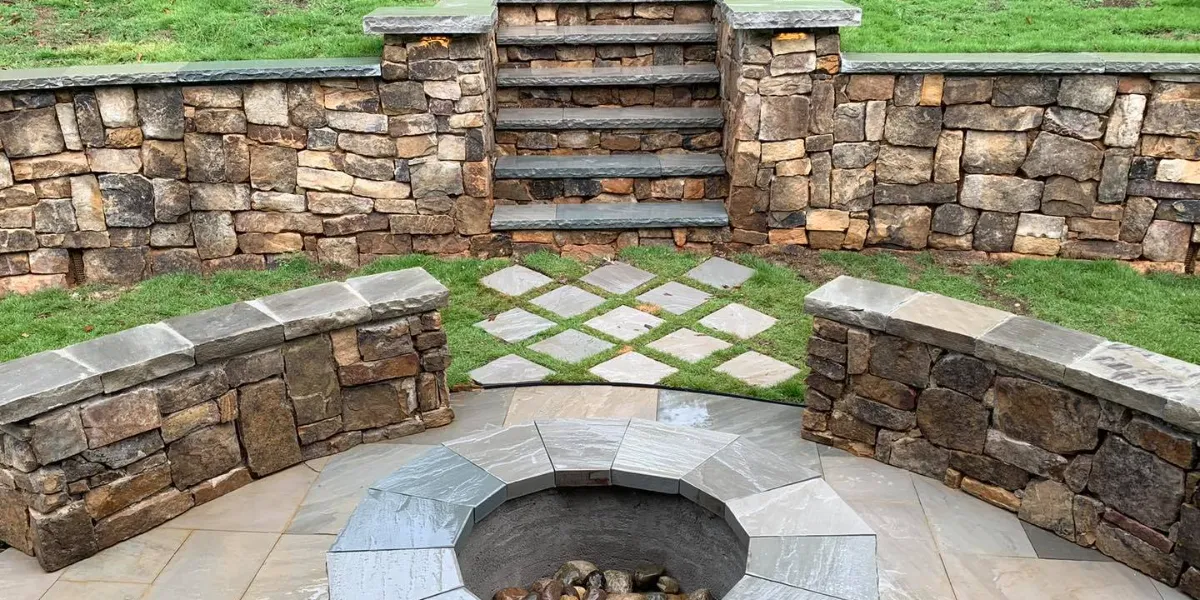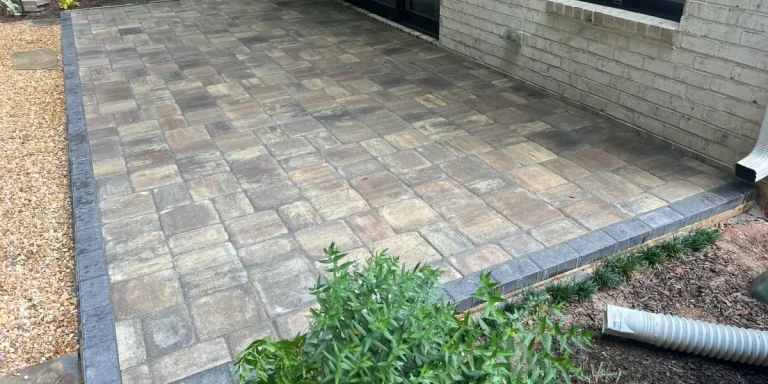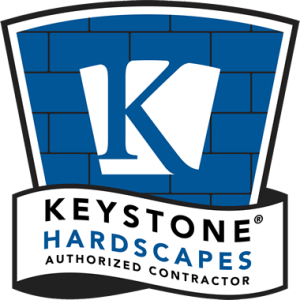Best Retaining Wall Materials for Georgia Soil
Choosing the right material for your retaining wall is about more than just looks—especially in Georgia, where the soil and climate can significantly impact how well a wall holds up over time. At GCO Landscaping, we build retaining walls that do more than just hold back dirt—they’re designed to last, drain properly, and look great doing it.
Why soil type matters when building a retaining wall
In Sharpsburg and across much of Georgia, the dominant soil type is heavy clay. While clay is common in our region, it presents several challenges when building a retaining wall—especially if the wall isn’t properly engineered for these conditions.
The issue with Georgia clay
Clay soil retains water and expands when saturated. This movement can push hard against a retaining wall, causing damage over time if the structure wasn’t built to handle the pressure. You might see:
-
- Cracks in the wall face
- Bulging or leaning sections
- Drainage issues or pooling water
These problems typically stem from either poor material selection or a lack of proper drainage during installation.
Drainage problems in clay-heavy soil
One of the biggest challenges with Georgia clay is its slow drainage. Water doesn't move through the soil quickly, which means it tends to collect behind retaining walls. This leads to a buildup of hydrostatic pressure—something even a well-built wall can't withstand without proper planning.
To protect your retaining wall, it’s critical to include:
-
- Gravel backfill to encourage water movement
- Perforated drain pipes to redirect moisture
- Weep holes to allow trapped water to escape
- Compacted base materials for structural support
Why local experience matters
At GCO Landscaping, we specialize in retaining wall construction that’s tailored to Sharpsburg’s soil and slope conditions. We don’t just build walls—we engineer long-term solutions that take your property’s unique terrain into account.
Whether you need a wall to level your yard, control erosion, or create a raised planting bed, we ensure it’s built with the right materials and drainage systems to perform in Georgia’s challenging clay soils.
Top retaining wall materials for Georgia landscapes
Choosing the right retaining wall material isn’t just about appearance—it’s about performance, longevity, and how well it handles Georgia’s heavy clay soil. At GCO Landscaping, we carefully select materials based on your property’s slope, soil type, and the overall design of your landscape.
Here are the four most common materials we use in retaining wall construction across Coweta and Fayette County:
1. Concrete blocks (Segmental Retaining Wall Units)
Best for: Structural walls, tiered landscaping, modern or clean-lined designs
Why we recommend them:
-
-
- Extremely durable in Georgia’s clay-heavy soil
- Designed for load-bearing and long-term performance
- Available in a wide range of colors, textures, and styles
- Interlocking system increases structural integrity and speeds up installation
- Compatible with drainage solutions like gravel backfill and perforated pipe
-
Concrete blocks are one of the most versatile materials we use. Whether you're building a multi-tiered landscape in Peachtree City or a functional wall to manage runoff in Newnan, block systems are engineered to perform. Their modular design allows for curves, corners, and height variations, which makes them ideal for both functional and decorative purposes.
These walls also integrate well with other hardscaping elements like paver patios, steps, and garden beds, helping you achieve a cohesive look.
2. Natural stone
Best for: High-end homes, rustic or traditional landscapes, visible front-yard installations
Why we recommend it:
-
-
- Adds unmatched visual appeal with timeless charm
- Offers natural variation in color and texture
- Can be dry-stacked or mortared for different aesthetic results
- Allows for natural water movement through the joints when dry-stacked
- Complements boulders, water features, and native plantings beautifully
-
Natural stone is a premium choice for homeowners who want their retaining wall to stand out as a focal point. We often recommend it for projects in Senoia or Chattahoochee Hills where a more organic or luxurious look is desired. While stone tends to be more labor-intensive and costly, it creates stunning, one-of-a-kind results.
3. Treated timber
Best for: Budget-conscious homeowners, temporary solutions, small-scale garden walls
Why we recommend it in select cases:
-
-
- Fast and affordable to install
- Suitable for non-load-bearing or decorative applications
- Blends well with wooded or natural properties
-
Treated wood can be a good option for low-impact areas or short-term use. However, it’s important to understand its limitations—especially in humid Georgia environments. Timber is more susceptible to rot, insect damage, and warping, which reduces its overall lifespan. We generally reserve this material for small garden beds or DIY-style projects in backyards that don’t require structural support.
4. Poured concrete
Best for: Commercial sites, multi-level properties, or walls requiring maximum strength
Why we recommend it for large-scale projects:
-
-
- Highest strength-to-cost ratio for tall or load-bearing walls
- Customizable finishes and forms
- Excellent choice for structural retaining walls on steep slopes
- Long lifespan with minimal maintenance when installed correctly
-
Poured concrete is a powerful solution for challenging properties—especially when height and strength are non-negotiable. With proper formwork, reinforcement, and waterproofing, these walls can handle intense soil pressure and long-term exposure to the elements. While more expensive than block walls upfront, they offer unmatched durability and can be finished to suit various design styles, from smooth modern to textured stone-like surfaces.
Which retaining wall material is right for your Georgia property?
At GCO Landscaping, we don’t believe in one-size-fits-all solutions. Every retaining wall we build is tailored to the property’s specific needs—whether that’s stabilizing a steep slope, preventing erosion, or enhancing the overall look of your outdoor space.
For most residential landscapes in and around Sharpsburg, Peachtree City, and Newnan, we often recommend concrete block or natural stone retaining walls. These materials offer the best combination of strength, drainage performance, and visual appeal for Georgia’s heavy clay soil and varied terrain.
Our team manages the entire process, including:
-
- On-site evaluation and material recommendations
- Custom design based on your yard’s slope and layout
- Excavation and base preparation
- Installation of proper drainage systems
- Professional construction using proven techniques
Whether you want a practical wall to manage runoff or a beautifully crafted structure that complements your paver patio or garden beds, we’ll help you choose the best material—and build it to last.
Design tips for longer-lasting retaining walls
To ensure your wall performs as well as it looks, keep the following in mind:
-
- Plan for drainage. Use gravel backfill, filter fabric, and weep holes to prevent water pressure buildup.
- Use the right base. A compacted gravel base prevents settling and adds stability.
- Match the wall to your yard. For sloped backyards, consider building multiple low terraces instead of one tall wall.
Proudly serving Sharpsburg and surrounding areas
GCO Landscaping provides professional retaining wall installation throughout:
-
- Sharpsburg
- Peachtree City
- Newnan
- Fayetteville
- Senoia
- Tyrone
- Chattahoochee Hills
- Coweta County
- Fayette County
Whether you're in a residential neighborhood or managing a sloped rural property, we’re ready to help you build a retaining wall that lasts.
Get a retaining wall built for Georgia soil
If your property needs a retaining wall that’s both functional and beautifully built, we’re ready to help. Contact GCO Landscaping today to request an estimate or schedule a consultation.
We specialize in retaining wall construction, paver patios, and new lawn installations for homes and businesses throughout the Sharpsburg area. Let’s build something lasting, together.




